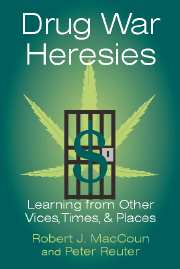Book contents
- Frontmatter
- Contents
- List of Figures and Tables
- Acknowledgments
- PART I OVERVIEW
- PART II THE ARGUMENTS
- PART III THE EVIDENCE
- PART IV ASSESSING THE ALTERNATIVES
- 13 Summary of the Evidence and a Framework for Assessment
- 14 Projecting the Consequences of Alternative Regimes
- 15 Obstacles to Moving Beyond the Drug War
- Bibliography
- Data Sources for Figures
- Author Index
- Subject Index
14 - Projecting the Consequences of Alternative Regimes
Published online by Cambridge University Press: 24 May 2010
- Frontmatter
- Contents
- List of Figures and Tables
- Acknowledgments
- PART I OVERVIEW
- PART II THE ARGUMENTS
- PART III THE EVIDENCE
- PART IV ASSESSING THE ALTERNATIVES
- 13 Summary of the Evidence and a Framework for Assessment
- 14 Projecting the Consequences of Alternative Regimes
- 15 Obstacles to Moving Beyond the Drug War
- Bibliography
- Data Sources for Figures
- Author Index
- Subject Index
Summary
In this chapter, we attempt to project the most likely consequences of various alternative regimes for cocaine, heroin, and cannabis – the three drugs most central to the drug legalization debate. Doing so is hazardous given the limitations of the available evidence, but using the analytical framework to make projections helps to illustrate the kinds of tradeoffs involved in choosing among drug control models.
We consider alternative cocaine and heroin models together because many of the issues are similar, but the differences are such that in the end we are more sanguine about changes in heroin control than reform of cocaine laws. Like many previous authors, we consider cannabis separately because the prospects for change and the plausibility of change seem more promising. To justify our arguments, we briefly review the evidence on the harms of cannabis use and on its alleged role as a gateway to hard-drug use.
PROJECTIONS FOR COCAINE AND HEROIN
We now use the framework outlined in Chapter 13 to offer what we believe are the most plausible projections as to the likely consequences of changing legal control regimes for cocaine, heroin, and cannabis. In addition to the possibility of relaxing user sanctions (i.e., depenalization), our spectrum of regimes suggests at least six different alternatives to strictly prohibited access (prohibitory prescription, maintenance, regulatory prescription, user licenses, regulated adult market, and a free market).
Even limiting ourselves to the three most important illicit drugs (cocaine, heroin, and cannabis) leaves at least twenty-one different scenarios – an unmanageable number.
- Type
- Chapter
- Information
- Drug War HeresiesLearning from Other Vices, Times, and Places, pp. 328 - 370Publisher: Cambridge University PressPrint publication year: 2001



